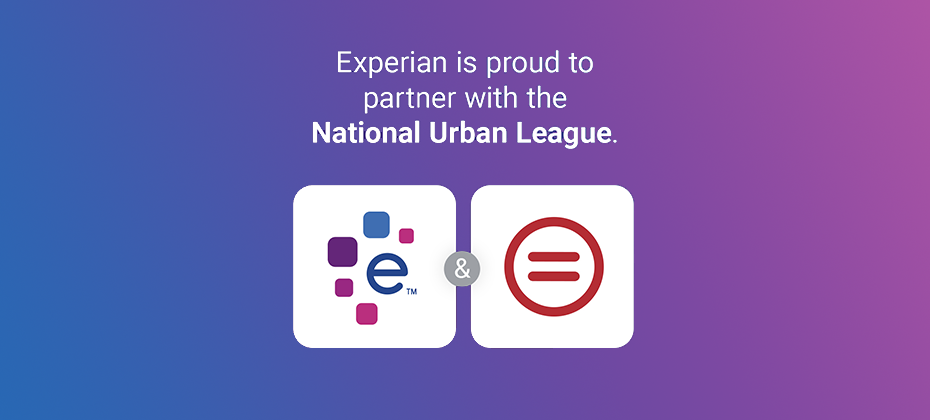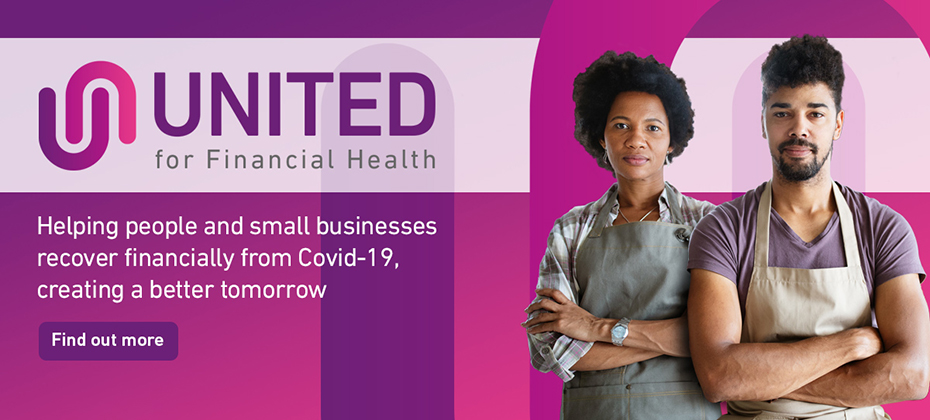Financial Education
One of the largest barriers to financial inclusion is a lack of financial education. Experian is changing that. Our partnerships and initiatives are dedicated to getting the proper tools, resources and information to underserved communities so that consumers can best understand and improve their financial health. Read about our financial education news below:

The largest Hispanic civil rights and advocacy organization in the U.S., UnidosUS, held its LatinX IncluXion Summit this week and I had the pleasure of participating as a featured speaker. One of the conference’s themes this year was “Reimagining our Future” and that resonated with me quite a bit. As an immigrant who has had to reimagine my life and career many times over, I shared some advice on how we can reinvent ourselves, become empowered by those opportunities and give back to our communities. Experian’s support of UnidosUS is especially meaningful to me. As co-executive sponsor of Juntos, our Hispanic and Latino employee resource group, I’m proud to be part of our partnership launch that extends beyond the conference. As part of our United for Financial Health initiative, Experian is supporting the organization’s Financial Empowerment Network (FEN) which provides free, financial coaching for Latino families. I have always been passionate about financial inclusion because I believe it helps empower people to be independent and take care of their families. This is especially true for immigrant communities that already must deal with the challenges of acclimating to a new country, culture, language, and more. Since joining Experian, I have been involved in initiatives that look to expand access for disenfranchised consumers, and a huge portion of my volunteerism has been devoted to educating this community about the benefits of intentionally managing their budgets and what are the best ways to gain access and handle credit. It’s not just UnidosUS affiliates and members who will benefit from our cross-cultural work. Our new Spanish-language consumer education e-book, credit education articles in Spanish, and the new monthly #ChatDeCrédito launched during Hispanic Heritage Month are available to all consumers. Having credit education resources available in-language is just one of many ways we can help those who have faced barriers to accessing credit and financial tools. We look forward to our partnership with UnidosUS and continuing to empower the Hispanic-Latino community.

The historic civil rights organization, the National Urban League, kicked off its first-ever virtual national convention recently, and Craig Boundy, former Chief Executive Officer of Experian North America had the honor of joining them. National Urban League President and CEO Marc Morial and Craig announced our new partnership that will support financial inclusion and credit education. During the announcement, Marc mentioned one of the key findings of the Urban League’s 2021 State of Black America – The New Normal: close to 17 percent of Black households lacked basic financial services, compared with three percent of white households in 2017, the last year for which FDIC statistics are available. He characterized this as a “disastrous and disproportionate impact of the COVID pandemic on the economic stability of African American communities.” We believe working together will make a big difference in the lives of underserved consumers. As part of our United for Financial Health program, Experian is providing National Urban League members access to credit education tools and services like consumer credit reports and Experian Boost™, as well as resources for small businesses. As Craig mentioned in his remarks, “at the heart of this partnership is knowledge: when you understand financial services, you come to understand the financial system. You can take steps to create and improve a relationship with financial service providers. That can make a huge difference today, and for future generations.” This partnership is just the start of our relationship with the National Urban League, and we look forward to working together towards closing the wealth gap and empowering consumers to achieve their life’s goals.

There are times in most of our lives where we can't get access to the financial system in a way that we want. Be it for a mortgage, a car, or a business loan. We've all experienced the frustration when you feel you're on the outside of the system and you can’t do the things you want for yourself or your family. At Experian, it's our job to change that. We want to make sure everybody is included and has access to fair and affordable financial products. Financial inclusion is fundamental to our business. With our focus on increasing access to financial services, improving financial literacy and confidence, and helping people manage their financial lives; we help power people and businesses to create their future. In fact, the United Nations includes access to financial services, such as credit and microfinance, among its Sustainable Development Goals. Access to affordable credit opens the door to opportunities for people to transform their lives – from homes and healthcare to education and entrepreneurship. This has never been more important than it is today. Creating a Campaign to Drive Financial Health Worldwide As the pandemic took hold in 2020, we stepped in with data and analytics to support governments, health services and national emergency response efforts through major initiatives such as COVID Radar in Brazil and Experian CORE (COVID Outlook & Response Evaluator). These are just two examples of how we can use our data and expertise to make the biggest difference to society. It soon became clear that the impact — not just on physical health, but on financial health — would be far-reaching for people around the world. We looked at how we could use our expertise and resources to help vulnerable communities through the crisis and focused on financial education as the best way to strengthen their resilience and support their road to recovery. We launched our United for Financial Health programme. We rapidly established 11 NGO partnerships across our biggest consumer markets to deliver targeted financial education for some of the communities hit hardest by COVID-19. By the end of the year, we had reached nearly 35 million people, more than double our original goal of 15 million, and we’re not stopping there. We aim to reach 100 million people by 2024. Part of our efforts include our member relationships around the world. This year, we surpassed the milestone of 100 million direct relationships with consumers globally and delivered further innovations to support people through our business, with the launch of products like Experian Boost in the UK and Serasa Score Turbo in Brazil. This, of course, is on top of our ground-breaking Experian Boost launch in the United States in 2019. Our goal is to have a direct relationship with as many people as possible; to truly become the Consumers’ Credit Bureau and power financial opportunities for all. Driving Innovation with Social Purpose Our culture of innovation helps us harness opportunities to drive business growth. We are continually investing in product innovation and new sources of data to address emerging market opportunities that can make a real difference to global communities. In 2020, around 1,000 “innovators” from across Experian joined our annual Future of Information Conference, which was held virtually because of the pandemic, to encourage them to think differently in their work. Topics included fairness in artificial intelligence, transforming agribusiness and enhancing the consumer healthcare experience. Teams at our DataLabs in Brazil, Singapore, the UK and the USA tap into our culture of innovation to continually create new solutions to global challenges. The result of all this is that our Social Innovation products have now reached 61 million people since 2013. We aim to reach 100 million by 2025. As John Hope Bryant, CEO of one of our NGO partners Operation HOPE, says, “Experian’s commitment to unlocking the power of data to create opportunity means more people will be set up not just to survive, but to thrive in the months and years to come.” In this year’s Sustainable Business Report our commitments come through stronger than ever. We are raising our ambition and aiming to reach 100 million people through our social innovation products by 2025. Our goal is to reach 100 million people through our United for Financial Health campaign by 2024. We have also pledged to protect our planet by becoming carbon neutral in our own operations by 2030. We know we’ve got more work to do and we remain focused on using our business to make real and sustainable change. With social innovation running so deeply through the core of our culture, and our commitment to improving global financial health front and centre of our thinking, we will continue to push to find new solutions to help people, serve communities and protect the environment, helping to create a better future for all. All of this is very personal to me. I passionately believe we can and should drive to make a difference in society. I serve as executive sponsor of our ESG programs and this isn’t just another corporate program, it’s at the heart of what we do as a company to power financial opportunities. My personal pledge is to continue to keep you updated, as we progress our agenda to sustainable environmental and societal change. Read the full SBR report here.

At Experian, we create a better tomorrow by powering opportunities for consumers, customers, our people and communities. We use the full range of our capabilities to drive financial education and inclusion, and one of the ways we do this is through our United for Financial Health programme. I am delighted to announce the launch of this important programme in two of EMEA’s markets today. We’re excited for the positive difference our two new partnerships will make to help vulnerable consumers financially recover from the impacts of Covid-19. In Italy, incidents of domestic violence have increased considerably during the global pandemic, with the Italian National Institute of Statistics reporting a 75% increase in calls to anti-violence helplines in 2020 alone. Further statistics show women are particularly affected by unemployment due to Covid-19, reducing victims’ financial independence and their ability to escape from situations of abuse. The increase in domestic violence since the onset of the pandemic has also been highlighted globally by the UN. To help those impacted, we intend to partner with MicroLab and Microfinanza, who support women victims of domestic violence, foreign caregivers, and young people not in employment, education or training (NEETs). Our partnership aims to help these people access credit, so they have the financial means to improve their current situation, and take steps toward creating a better tomorrow. We will collaborate to deliver financial education, and we intend to develop an app that captures open (non-traditional) financial data to help them build their credit profiles. In South Africa, unemployment stands at 32.6%. A large proportion of people in the country run or work for small to medium-size enterprises (SMEs). By helping these organisations access affordable credit so they can continue to operate through the pandemic, we believe we can have a tangible impact on people’s employment. We will partner with the National Small Business Chamber, a non-profit membership organisation that supports SMEs. Together, we will educate small business owners on their financial and credit health, empowering them to improve their personal and business credit profiles to access the funding required to maintain and grow their businesses. Combined, we estimate our partnership with our NGO partners will reach 3.8 million consumers, helping deliver on our Company’s commitment to reach 100 million people by 2024. We start work on these projects today on our path to creating a better tomorrow.

In most parts of the U.S., the start of summer marked the lifting of many pandemic led restrictions. Capacity limits, mask mandates and social distancing requirements are being removed and many of us are spending more time doing the things we enjoyed prior to the onslaught of COVID-19. There is no question the pandemic created serious financial challenges for millions of Americans, yet many people found opportunity to improve their financial standing. Fewer options for travel, dining and entertainment reduced costs, while the government stimulus packages helped maintain or increased available funds. Personal savings surged, and lower credit card balances and fewer missed payments spurred an uptick in average credit scores. Sadly, at the same time, many consumers struggled to make ends meet as they faced job loss, illness or cared for ill friends and family. As the world starts to reopen and things begin to feel a bit more normal, many people have questions about how they can improve (or protect their newly improved) credit scores and prepare for a financial healthy summer. One of the best places to start is by checking your credit report. You can get a copy of your Experian credit report and a FICO Score at no cost every 30 days by enrolling in our free service. When you enroll you not only receive a free credit report and score each month, but also have access to other services that can help you protect your financial health, including credit monitoring and alerts and credit card and loan offers that are tailored to you. The belief that checking your own credit report will hurt your credit scores is a common misconception. You should check both your credit report and scores often. You can also get a free credit report from each of the three bureaus once every week at www.annualcreditreport.com through April 2022. In addition to getting your free credit report from Experian, here are five other things you can do to improve or maintain your credit standing this summer: 1. Prepare for big purchases. Regularly checking your credit report and credit scores is always a good idea. This is especially true if your summer plans include applying for new credit cards, auto loans or a mortgage. I recommend getting a copy of your credit report and credit scores three to six months ahead of applying for new credit, especially if it’s a major purchase. Doing so can help you ensure there are no signs of identity theft and that your credit scores are as good as they can be when you apply. Use this link to get a free copy of your Experian credit report with a FICO Score. 2. Have a summer spending plan. After many months spent at home with little to do, it may be hard to avoid the temptation to overspend. It’s great that we can pick up canceled travel plans and get together with friends and family, but don’t try to make up for lost time at the expense of your financial health. Create a budget outlining what you can afford to spend this summer and build your plans from there. Doing so can help you avoid the temptation to overspend and prioritize what’s important to you. 3. Get credit for paying your bills on time. While this summer may be filled with less Netflix binging than last summer, you can still use your on-time bill payments to your advantage. Experian Boost allows you to get credit for paying your streaming service, cell phone, internet, utility bills and other bills on time. 4. Avoid missed payments. Nothing will hurt your credit scores more than missed or late payments. To maintain a positive credit history, make a plan to catch up on any missed payments and contact your lenders if you think you may fall behind. Sometimes summer plans can disrupt routines. Enrolling in autopay can be a helpful way to stay on a payment schedule that works for you. 5. Keep your card balances low. Your utilization rate, or balance-to-limit ratio, is an important factor in determining your credit scores. It is calculated by adding all your credit card balances at any given time and dividing that amount by your total credit limit. Lenders typically like to see ratios of 30% or less, and people with the best credit scores often have very low credit utilization ratios. A low credit utilization ratio tells lenders you haven't maxed out your credit cards and likely know how to manage credit well. Keep in mind that if you use your credit cards for summer travel plans or vacations and pay your balances down when you return home, you may still see a temporary drop in your credit scores. Your lender reports your account status about once a month, so it could be several weeks before your report is updated. Scores calculated after your report is updated will reflect the paid off amount. Depending on when you made a payment, it could take a full billing cycle before your credit report is updated and your credit score reflects those changes. Remember, credit can be a financial tool, but debt is a financial problem. If you’re looking for more resources on credit education, head to the Ask Experian blog or join us for an upcoming Credit Chat every Wednesday at 3 p.m. EST on Twitter. Until then, I hope you have a happy, safe and financially healthy summer.

We recently wrapped up a special community outreach effort during Financial Literacy Month that reflects something important to Experian – helping consumers, especially underserved populations, understand credit and how to harness it to their benefit. It’s important to rally around a cause like this at peak times throughout the year, but financial literacy and, more importantly, financial power for all is what drives us every day, every month and every year. Empowering consumers is the fuel behind our innovation and the portfolio of credit tools we have developed in the past few years and those to come. While there are different viewpoints around the use of credit scores to assess consumers’ credit-worthiness, credit bureau data remains the most effective means for understanding a consumer’s financial situation. This is why we continually innovate to find new ways of utilizing that data to give consumers more control and allow lenders to see well-rounded consumer profiles. Our charter led to the launch of the first-of-its-kind tool, Experian Boost. By allowing consumers the ability to directly add positive payment history for recurring utility and telecom bills – even video streaming services - to their Experian credit report, they can take a proactive step to improve their credit score and gain more control. While lenders benefit by seeing additional data about consumers that considers positive behavior for paying these types of recurring bills that hasn’t been factored in the past. It’s a win-win situation, and we’ve seen the positive results. To date, Experian Boost users have gained access to more than 1.7 billion total dollars in credit as a result of improving their credit scores, while 1 million consumers added a credit card in the first year after the launch. Also, nearly 250,000 consumers acquired an auto loan and some consumers earned a credit score for the first time. For those who had thin files and weren’t able to enter the credit ecosystem before, obtaining a credit score for the first time and learning how to improve it can be life changing. Our mission is to drive financial inclusion and facilitate access to fair and affordable credit for consumers; that objective is not just on our minds during one particular month out of the year. Experian Boost was a lengthy initiative in the making, and we believe one big step in the right direction to achieve our objective. It won’t stop there. I’m looking forward to more innovation to come that continues to assist consumers in gaining more credit knowledge and control over their credit in order to reach their financial goals.

Does checking my credit report hurt my credit score? How can I improve my credit score? What’s the difference between a credit score and a credit report? These are a few of the questions I most often hear about credit, and the answers to these fundamental questions are essential to financial well-being. Understanding credit scores and the factors that influence overall credit health is important any time, but this is especially true in our current environment. As part of our ongoing commitment to consumer education on the road to recovery, I recently had the pleasure of partnering with Akbar Gbajabiamila, host of American Ninja Warrior, former football pro and financial fitness expert, for an Instagram Live event. Akbar is passionate about helping people develop a financial game plan and he understands having a good credit history is a key component of good financial health. During the Instagram Live event, I answered questions from Akbar’s fans and shared ways to improve your credit score through tools like Experian Boost. In case you missed it, you can watch the video recap on Akbar’s Instagram account (@akbar_gbaja) or at the following link: https://www.instagram.com/tv/CLpbdDJlaQ6/ View this post on Instagram A post shared by 🇳🇬Akbar Gbajabiamila🇺🇸 (@akbar_gbaja) A positive credit history can be the gatekeeper to many of the things we all want in life, and we’re committed to helping facilitate fair and affordable access to credit for all consumers, including those in marginalized communities. This is one of the many reasons I’m passionate about my role at Experian. Educating consumers about credit is an important part of getting the economy as a whole humming again and helping those most in need. If you have additional questions about credit, feel free to check out the free resources below. Additional credit education resources and tools Join Experian’s weekly#CreditChat hosted by @Experian on Twitter with financial experts every Wednesday at 3 p.m. Eastern time. Visit the Ask Experian blog for answers to common questions, advice and education about credit. Add positive telecom, utility and streaming service payments to your Experian credit report for an opportunity to improve your credit scores by visiting experian.com/boost. You can request a free copy of your credit report from each of the three credit bureaus once a week through April 20, 2022 by visiting annualcreditreport.com For additional resources, visit https://www.experian.com/consumereducationor experian.com/coronavirus.

There’s no question the COVID-19 pandemic is contributing to a unique 2020 holiday season, but there are consistent truths that remain when it comes to the holidays and personal finance. While the season is known for being merry and bright, sadly, financial challenges and stress are equally common for many this time of year. According to our latest holiday spending survey, 60% of consumers feel stressed about their finances during the holiday season and half feel the extra expense of the holidays makes them hard to enjoy. More than half (52%) say COVID-19 has caused credit or financial barriers which are preventing them from doing their shopping the way they had planned. At the same time, 62% agree holiday shopping puts a strain on their finances. In an effort to alleviate some of the financial stress some may be facing, I wanted to share three ways you can protect your financial health this holiday season and prepare for a financially healthy new year: Start with a budget and a plan. It’s easy to lose track of spending and take on unexpected debt during the holidays, which is why creating a budget is an important first step to protect your financial health. Experian research shows the average American plans to spend $775 on holiday gifts this season, but your holiday budget will depend on your unique financial situation. Outline how much you can realistically afford to spend and try to factor in expenses that are sometimes overlooked, which can be a challenge. In fact, our research found four out of five consumers often run into unexpected expenses they hadn’t planned for, including buying unexpected gifts (25%), gift wrapping supplies (25%) and mailing costs for sending gifts (21%). Once you’ve outlined your budget, creating a plan for who you need to shop for and where you’re going to shop can be a helpful next step. Our survey showed 62% of consumers plan to shop more online this year due to COVID-19. If you’re planning to do more shopping from the comfort of your home this year too, tracking online sales and promotions can help you save money, and factoring in shipping costs can help keep your holiday budget on track. Setting a budget and sticking to it, and having a shopping plan to avoid impulse buying will help keep you from falling victim to the pressure of overspending around the holidays. Use credit as a financial tool. Over half of shoppers say they will use credit cards and not cash when holiday shopping. This is an 8% increase from 2019. While using credit wisely is important all year, this is especially true around the holidays. The key is strategic use of credit – whether using a card that provides low interest, rewards points, or cash back – to improve the shopping experience and stretch your dollars. Over a quarter of people say they plan to open a new credit card for the holiday season, which is a 5% increase year-over-year. The top reasons for wanting to open a new card include seeking a promotional no annual percentage rate (APR) credit card, wanting to get a retail store discount, and maximizing spending by getting a card with cashback rewards. If you’re considering applying for a new credit card, improving your credit score can help you take advantage of the best credit offers this holiday season. Experian Boost allows you to get credit for paying your telecommunications, cell phone, utility bills, and streaming services payments on time. More than 4.9 million consumers have connected to the service since March of 2019 and about 61% of those who use Experian Boost see their scores improve. When you’re ready to explore credit card options, Experian’s free Credit Match program can help you find personalized credit card offers based on your unique credit history. Remember, credit is a financial tool, debt is a financial problem. Debt you can’t repay will certainly bring down one’s holiday spirit. If you don’t have a plan for paying off your credit card, using credit may not be a good idea. Protect your identity. The holidays may be the riskiest time of the year when it comes to identity theft and credit fraud. Identity thieves of all sorts are aware that consumers spend significantly more during the holiday season. While many of us are hunting or scrolling for the perfect gifts for friends and family, fraudsters are hard at work too. The number of consumers surveyed who have been identity theft victims during past holiday shopping seasons jumped to 24% from 12% in 2019. The holidays are always a ripe time for cybercriminals with the increased online traffic and this is especially true against the backdrop of COVID-19. To protect yourself from identity theft while shopping online, avoid using public WiFi networks, create strong passwords for your online accounts, and only shop on secure websites you are familiar with. If you are shopping at a store, be sure to cover your credit card information when you enter it, or your personal information if you are applying at the point of sale. Shoulder surfers can use their phones to take a quick photo or video to steal your identity. Also avoid leaving your purse or wallet, or any documents in your car. Identity thieves stalk parking lots looking for opportunity that is just a broken window away. Credit cards offer more protection for both online and in-person purchases than your debit card or cash, so consider using credit for your purchases. If fraud occurs, the money is not gone from your checking account and you can file a claim with your card issuer. Pay the balance in full right away to avoid interest charges. Checking your credit report often can help you spot fraudulent activity. You can get a free credit report from all three bureaus at AnnualCreditReport.com through April 2021. Identity theft monitoring is an easy way to monitor your financial accounts and credit report to identify possible fraud such as a credit card account opened in your name. While the holidays may look a little different this year when it comes to protecting your financial health the same rules still apply. For more information about how to protect your credit history in 2020 and beyond, visit www.askexperian.com or join our weekly CreditChat every Wednesday on Twitter at noon PST/3 p.m. EST.

At Experian, our mission is to increase financial inclusion by empowering consumers. Through our corporate responsibility work, we have always been committed to using our resources to help more people improve their financial health through non-profit partnerships, data analytics, products and services, volunteering and educational programmes. Now, we have an opportunity to reach even more people in hugely underserved communities. Experian has launched the global United for Financial Health project to empower vulnerable people to improve their financial health through education and action. Through the United for Financial Health programme, Experian is partnering with non-profit organizations across the globe to deliver tools and resources to help those affected the most, and certainly, COVID-19 has amplified the need. We have already launched our first three partnerships in the U.S: Operation HOPE – an organisation whose aim is to uplift disenfranchised youth and adults from poverty to thriving in a credit ecosystem. One of the goals of the partnership is to help ethnic minority groups who are struggling to raise and sustain a 700-credit score or higher. By helping people raise their credit scores we can shift their mindset from one of “survival” to “thriving” and make a real difference in their lives. For some, a higher score may mean the ability to purchase a new car, have a credit card, own a home, or simply save money for their family. Black Girl Ventures – a non-profit that advocates for Black and Brown women entrepreneurs and their small businesses. Our partnership will provide financial resources to help scale its BGV Style Pitch Competition and Amplify BGV Programs and we are a proud sponsor of BGV’s new weekly podcast, “From Hustling to Handling, How to Stay in Business.” Together, we will curate entrepreneurial education content to assist a broader audience with knowledge and best practices related to financial literacy and wealth management. NAACP Empowerment Programs – part of the largest and most pre-eminent civil rights organization in the U.S. Our partnership creates The Home Preservation Grant, which will provide grants to African American homeowners at risk of losing their homes because of COVID-19-related hardship. In the UK, we are delighted to launch a new partnership with the charity National Numeracy. Numeracy is the strongest predictor of a person’s financial literacy and is therefore crucial to their financial health. However, poor numeracy is widespread, and disproportionately affects low-income communities where people are most at risk of marginalization from the COVID-19 pandemic. Thankfully, confidence and competence with numbers is within everyone’s grasp, with the right support. Working together, we can inspire and support over 60,000 people to take positive steps towards building their confidence and competence with numbers, helping many of those most affected by this crisis take their next step towards improved financial health. We have already made good progress in a relatively short space of time and will continue to invest our energy into building further partnerships to reach more people in need of support. This is just the beginning of our journey, but we are confident that we can make a huge difference to millions of people in communities across the globe.